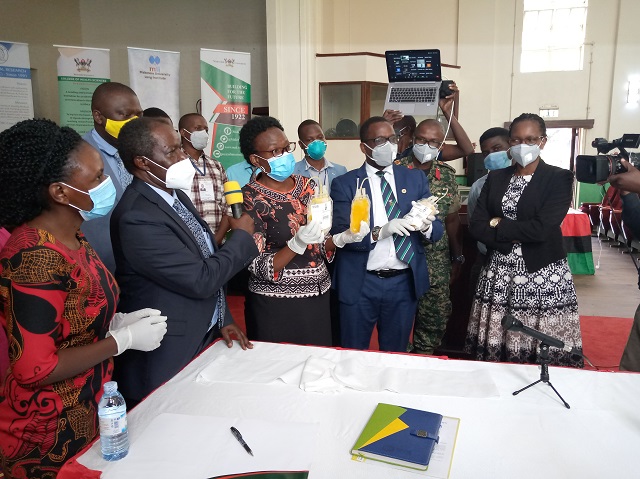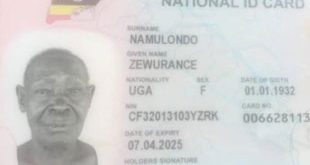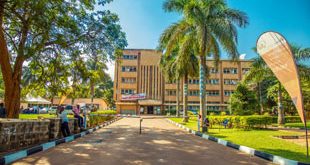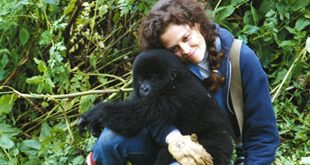
Kampala, Uganda | JULIUS BUSINGE | Dr. Jane Ruth Aceng, Uganda’s minister of health has given the green light to scientists from Makerere University and their partners to proceed with clinical trials for treating COVID-19 patients using convalescent plasma.
Aceng was speaking as chief guest at the launch of the Uganda COVID-19 convalescent plasma investigational new drug at Makerere University on Sept.16.
According to scientists, there is emerging evidence to support the use of COVID-19 convalescent plasma for treatment of COVID-19 especially among severe and critical forms.
Plasma is the clear, straw-coloured liquid portion of blood that remains after red blood cells, white blood cells, plantlets and other cellular components of blood are removed. It is the largest component of human blood.
A few months ago, a team of medical doctors from Makerere University working closely with government embarked on the feasibility study to collect and process the COVID-19 convalescent plasma for treatment of COVID-19 in Uganda.
According to Dr. Bruce Kirenga, one of the team leaders, it is anticipated that the drug that will be manufactured during this process will boost the body immune system and neutralize the virus.
The project was conducted by COVIDRES-Uganda Research Group; a multi-disciplinary research group coordinated by the Makerere University Lung Institute (MLI).
COVIDEPI study was led by Dr. Kirenga, a senior lecturer and director of MLI and Prof. William Bazeyo as Principle Investigators.
The other partners of the project are; Uganda Peoples Defense Forces Medical Services, Department of Medicine, Makerere University College of Health Sciences, Mulago National Referral Hospital, Joint Clinical Research Centre, Johns Hopkins University, Baltimore – USA and more.
The project is funded by the Government of Uganda through the Makerere University Research and Innovations Fund (Mak-RIF).
Dr. Kirenga said that despite the prevailing evidence of possible efficacy of COVID convalescent plasma in the treatment of COVID-19, very few African countries have undertaken the collection and processing of COVID convalescent plasma.
Their project, he said, was aimed at assessing the feasibility of collecting, processing and storing of COVID convalescent plasma for treatment of COVID-19 in Uganda.
In their approach, the scientists contacted and got to COVID-19 recovered individuals who had been managed and discharged at COVID-19 treatment hospitals across the country.
In their findings, 192 participants were approached (8 females, 184 males) and of these, 179 (93.2%) were eligible to donate. Of the 179 eligible to donate, 23 (12.8%) were not willing to donate. All eligible individuals were invited to the donation centre for further screening and donation. In the end, a total number of 162 donated and hailed from almost all regions of Uganda.
This plasma donation can only be administered to only 65 patients.
All the donated plasma was tested for coronavirus, and results turned-out negative.
Dr. Kirenga said, one significant finding was that all the plasma samples donated had enough anti-bodies to warrant use in the treatment of COVID-19 patients.
“Antibodies were higher among donors who donated closer to their date of first positive test or admission,” Dr. Kirenga said.
He told The Independent that clinical tests would commence immediately and take a period of three weeks after which, the country would be informed about the next course of action.
Going forward, the team said that as they undertake the trial plans for programmatic, processing and storage should be initiated such that if they find the plasma efficacious rapid acquisition and use of plasma can be implemented.
For programmatic plasma donation, donation centres should be decentralised to regional blood banks, they said.
The scientists also said, there is need to undertake sensitisation of the population about blood donation in general convalescent plasma donation particular to increase acceptable rate.
The other suggestion is that plasma donation should be arranged within few weeks after recovery so as to obtain high antibody plasma.
Dr. Rosemary Byanyima, the deputy executive director for Mulago National Referral Hospital said, they [Mulago Hospital] are not only taking care of COVID-19 patients but also taking part in the medical research. “What we need is more human resource support,” Byanyima said.
Minister Aceng used the same forum to urge the public to follow the COVID-19 standard operating procedures including hand washing, sanitising, wearing face masks and social distancing as scientists continue to innovate, find treatment and cure for the deadly coronavirus.
She said that Uganda has reached phase 4 of the pandemic which is; widespread community transmission of COVID-19 “We can longer control [the spread], we can only mitigate,” she said.
“People fear lockdowns and not COVID,” she said, “please cover your nose and sanitise willingly.”
She said COVID-19 is real; it is with us and can take any of us any time…anything that can be done to lessen and save life is highly welcome and appreciated.
Aceng said, the virus is now killing 2-3 people every day on average.
By Sept.16, Uganda had confirmed a total of 5, 123 cases, 2,333 recoveries and 58 deaths.
 The Independent Uganda: You get the Truth we Pay the Price
The Independent Uganda: You get the Truth we Pay the Price


